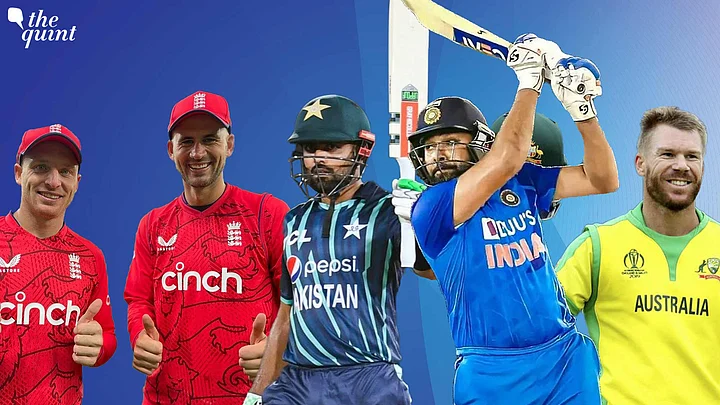Cricketers who test positive for COVID will not be restricted from playing with their teams at the upcoming Men's T20 World Cup, state the new International Cricket Council (ICC) guidelines.
According to the ICC's previous COVID-19 rules, players had to get a mandatory RT-PCR test, and those testing positive had to self-isolate for around 14 days.
COVID rules for players in international sporting events are generally dictated by the respective governing bodies of the sports in tandem with the government of the host country. For instance, some European football players who weren't vaccinated or fully vaccinated, were denied entry to the US earlier this year because they didn't comply with their vaccination mandates.
This time around, however, the Government of Australia - where the T20 World Cup matches are to be held - has also agreed to do away with COVID restrictions, as well as mandatory testing for players.
This will be the biggest sports event to be held in Australia since the COVID lock downs were first put in place in 2020, and is likely hoped to rejuvenate Australia's sports scene and boost the country's economy.
Is it time we all moved on from COVID restrictions? FIT asks experts.
Is It Time to Move On? What Experts Are Saying
The sports world isn't alone, government across the world are slowly doing away with COVID restrictions in a bid to 'get back to normal'. All things considered, are we ready to move on from the pandemic?
Speaking to FIT, Dr Anita Mathew, infectious diseases, Fortis says, "doing away with all the restrictions isn't the best thing, as the pandemic is still not over."
"The risk of transmission still exists, and the certain population is still more at risk of disease progression."Dr Anita Mathew, Infectious diseases, Fortis
So then, should you still follow COVID appropriate behaviour like masking and social distancing when institutions around you are not enforcing them any more?
Speaking to FIT for a different story, Virologist, Dr Gagandeep Kang, says it's for individuals to take informed calls.
"For people who are specially vulnerable, for whom vaccines do not necessarily offer protection very well and who have co-morbidities, I think it is for them to assess their own risk tolerance."Dr Gagandeep Kang, Virologist
Dr Mathew and Dr Kang both say that they haven't seen a notable uptick in COVID cases, more so in cases of serious illness and hospitalisations.
"Disease is milder than before. It's presenting with flu like symptoms and body ache, so the majority of patients aren't testing," says Dr Kang.
'Relax, But Don't Be Complacent'
However, things would have to change if we see an up tick in serious illness, and hospitalisations.
Dr Mathew adds that with the emergence of new, more transmissible COVID variants being reported in other parts of the country, "we may probably have an increase in cases in November."
"To reduce the disease burden, we need to be mindful of our behaviour," she reiterates, adding, "following COVID appropriate behaviour if ill is the best way to limit the disease."
While the world was preoccupied with COVID, other illnesses were put on the back burner. Now is the time to focus on these neglected health crises in India, says Dr Kang.
"From studies in other parts of the world, we know that hybrid immunity – one that comes from a combination of vaccination and infection, is the best immunity to have."Dr Gagandeep Kang, Virologist
"I think we, and the rest of the world, should be thinking about what our other priorities are...(and) how to build stronger health systems," she adds.
IPL, T20 Series, FIFA: How are Sporting Events Reemerging from the Pandemic
COVID rules in international sporting events have been far stricter in the past two years. Most of them were either held under tight restrictions, or cancelled entirely.
Just earlier this year in February, players who tested positive for COVID, including Sri Lanka leg-spin all-rounder Wanindu Hasaranga had to sit out of the T20 Series after testing positive.
To minimise the possibility of an outbreak, IPL 2022 was conducted in four venues in Maharashtra, and players were required to quarantine together for 14 days before the matches began.
At the time, all Indian players and support staff were required to undergo two RT-PCR tests with a gap of 24 hours between them, a week before joining the 14-day quarantine period with their respective teams in India.
But, after two years of cancelled events, empty stadiums, and refunded tickets, the sporting world seems to be ready to shed COVID pandemic norms, and make a comeback with workarounds to official COVID rules.
For instance, Qatar's official travel rules requires anyone entering the country that is unvaccinated to self-isolate for five days.
However, because this could hamper training and participation of teams, officials at FIFA Arab Cup 2021, did not require players to be vaccinated, or self-isolate. They were, instead, subject to increased tests in an effort to prevent an outbreak.
The upcoming FIFA World Cup, to be held in Qatar between 20 November and 18 December, is another huge international sporting event that's coming back in full swing after the pandemic.
Although fans travelling to Qatar to watch the matches will be required to download and use Qatar’s contact tracing app, Ehteraz whenever they leave the house, the rules for players are yet unclear.
(At The Quint, we question everything. Play an active role in shaping our journalism by becoming a member today.)
